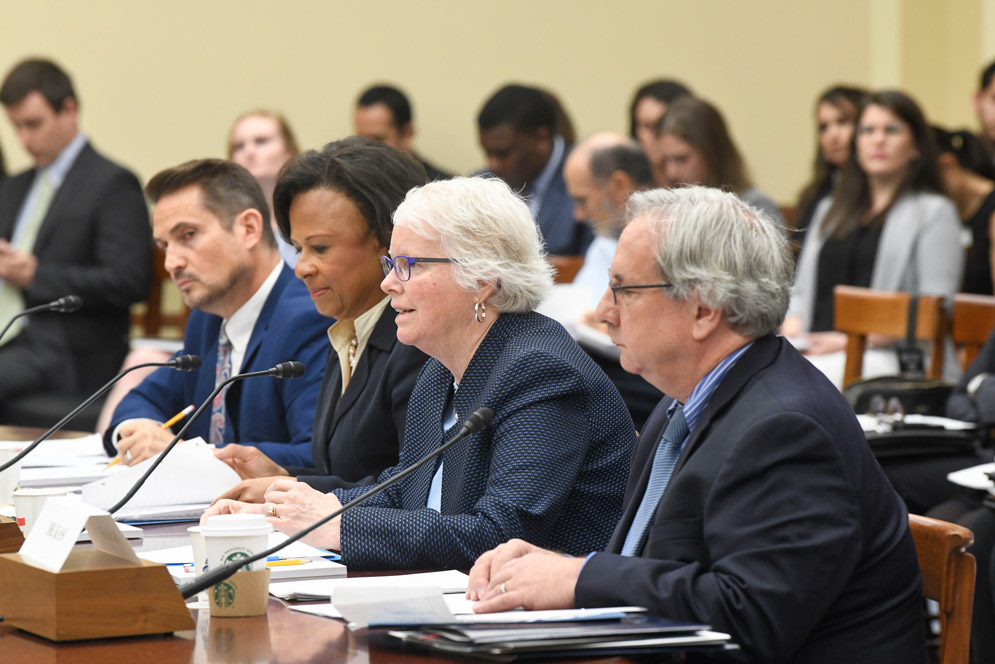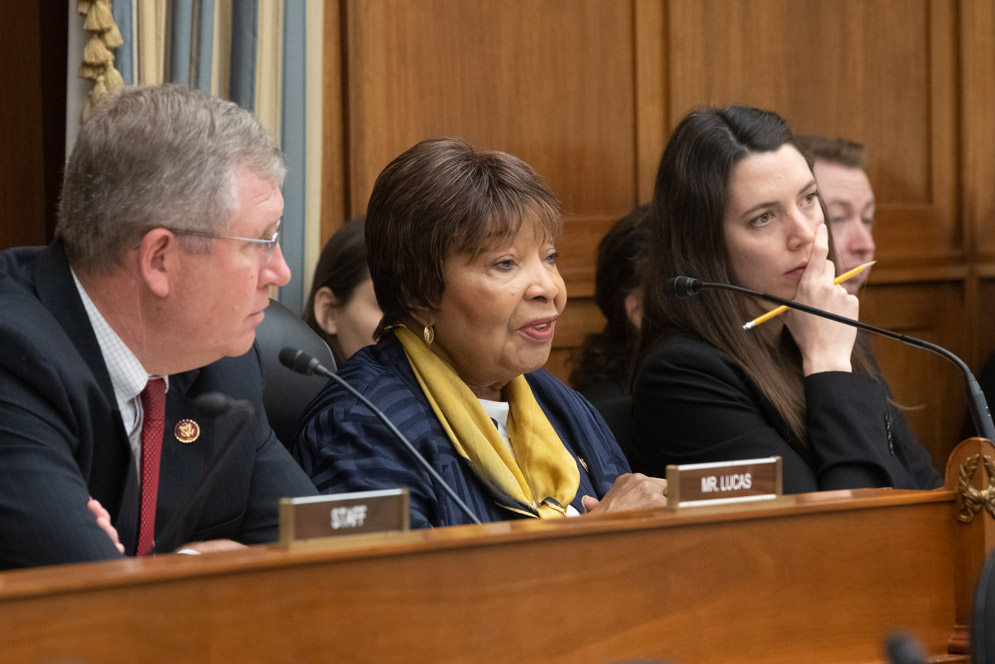BU Provost Speaks on Capitol Hill about Sexual Harassment in STEM
Jean Morrison: “I feel this issue very deeply and personally”

As Boston University provost, a renowned geologist and professor, and the mother of a daughter pursuing a PhD, Jean Morrison has a unique perspective on the subject of sexual harassment in the world of scientific research.
Morrison’s background was why the US House Committee on Science, Space, and Technology invited her to testify on June 12. The committee asked a small group of higher education leaders to speak about their institutions’ efforts to combat sexual harassment, mainly against women, committed by federally funded researchers in science, technology, engineering, and mathematics (STEM).
“It does no good to invest in programs to encourage young girls to pursue STEM studies if they end up in a research environment that drives them away,” said committee chair Representative Eddie Bernice Johnson (D-Tex.) in opening the hearing.
Morrison, in both her oral and written remarks, outlined how BU has improved its culture among researchers, both before and then after harassment claims against a College of Arts & Sciences professor of earth and environment led to his termination earlier this year. She said the case of David Marchant “reverberated powerfully at BU” and forced the University to “redouble our efforts to combat gender-based harassment.”
For BU’s provost, it’s an issue that resonates on many levels.
“I feel this issue very deeply and personally,” Morrison, who is also BU’s chief academic officer, told the committee members. “My daughter is in a STEM PhD program and I want her to have the opportunity to thrive.”
Today, Morrison said, BU emphasizes diversity, equity, and inclusion for women and underrepresented minorities in all major policy actions, as well as decisions related to hiring and promoting. In her written testimony, she noted that the National Academies of Sciences, Engineering, and Medicine 2018 report on harassment in academia says that taking “explicit steps to achieve greater gender and racial equity in hiring and promotions and improving the representation of women and underrepresented groups at every level of the University” is critical to creating a culture that rejects harassment.
She also said BU joined more than 55 other institutions to launch the National Academies Action Collaborative on Preventing Sexual Harassment in Higher Education so colleges can learn from one another to “bring the change we seek in academia.” And, she added, BU hired its first associate provost for diversity and inclusion, Crystal Williams, in 2017.
“I entered the academic world in the 1980s by pursuing a PhD in earth sciences,” Morrison said. “Like all aspiring scientists, we were taught that our science had to be rigorous, exacting, objective, and unforgiving in its pursuit of the facts.”
But that approach, she said, also created a culture that can no longer be tolerated.
“We created a tough, unforgiving and unwelcoming workplace environment,” she said. “No wonder, then, that people, especially our junior students and faculty, felt more hazed than helped, and that women, feeling the additional burden of gender discrimination, fared even worse.”
The House committee is exploring what lessons colleges and universities have learned from their own experiences and how they’ve acted to prevent future incidents. The testimony is being collected in advance of a vote on House bill H.R. 36, the Combating Sexual Harassment in Science Act.

During the hearing, Morrison was seated between Paula A. Johnson, president of Wellesley College, and Philip H. Kass, vice provost for academic affairs and a professor of analytic epidemiology at the University of California, Davis.
Johnson testified in her role as cochair of a National Academy of Sciences, Engineering, and Medicine committee that last year finished the report titled Sexual Harassment of Women: Climate, Culture, and Consequences in Academic Sciences, Engineering, and Medicine.
A major finding, Johnson said, was that the public is most aware of certain types of harassment—unwanted sexual attention and sexual coercion. But the public is far less aware of gender harassment, she said, which can be verbal or nonverbal and betray hostility, objectification, or exclusion or make one gender, typically women, feel as if they have second-class status.
In her written remarks, Morrison said it used to be that raising the issue of harassment could end a young scientist’s career. “You would not have been considered a serious scientist if you even raised the issue for discussion,” she wrote. “And, despite the existence at that time of laws and policies prohibiting sexual harassment and other forms of sex discrimination, attempts to report and enforce these laws and policies was also rare and could be perilous to a budding scientist’s career.”
A turning point, according to Morrison, was the publication of “A Study on the Status of Women Faculty in Science at MIT” in 1999. “It became acceptable to both be a serious scientist and to want to work to change the culture and enhance the opportunities for women in science and engineering,” she wrote.
In 2002, Morrison became the founding director of the University of Southern California’s Women in Science and Engineering (WISE) initiative. And as BU’s provost, she backed the launch of the ARROWS—Advance, Recruit, Retain & Organize Women in STEM—program.
The H.R. 36 bill directs universities to alert federal scientific agencies when anyone who has received funding has been found to have harassed someone. The bill also directs the National Science Foundation to fund research into sexual harassment in STEM fields.
Morrison’s experience with the Marchant sexual harassment case was a big reason the committee invited her to testify. Marchant was determined to have violated the school’s sexual harassment policies during expeditions to Antarctica in 1997 and from 1999 to 2000. Ultimately, a five-member faculty panel recommended he be suspended without pay for three years and then allowed to return to teaching. But this spring BU President Robert A. Brown overruled the panel, saying termination was the appropriate resolution, and the Board of Trustees accepted that resolution.
Morrison outlined to the committee a number of key areas where BU has worked to improve its research culture:
- “First, we are prioritizing diversity, equity, and inclusion.” She said hiring and promoting with gender and racial equity top of mind creates a community that rejects harassment.
- “We have changed the tenure clock to include time for parental leave, expanded child care offerings for employees and their families, and offered childbirth and adoption accommodations for doctoral students.”
- The University required all 34,000 undergraduate and graduate students and 11,000 faculty and staff to take mandatory online sexual misconduct prevention training.
- A Working Group on Gender-Based Harassment Prevention was created to make recommendations to Morrison for how BU can provide an environment free from harassment.
She also mentioned that earlier this year, BU earned an inaugural SEA (STEM Equity Achievement) Change Bronze Award from the American Association for the Advancement of Science, recognizing BU’s “commitment to diversity, equity and inclusion in STEM.” Specifically, the University was acknowledged for its commitment to supporting undergraduate students who are transitioning to PhD work, and for its efforts to grow the numbers of women STEM leaders at BU by helping more STEM women associate professors reach the rank of full professor.
When Morrison was asked Wednesday about any other changes BU has made to support researchers, she said the University recently implemented a formal vacation policy for its 2,000 PhD students.
Supporting researchers is a major focus of H.R. 36. The bill references all types of harassment, verbal and nonverbal, and notes that “58 percent of individuals in the academic workplace experience sexual harassment, the second highest rate when compared to the military, the private sector, and Federal, State, and local government.” According to the bill, “women who are members of racial or ethnic minority groups are more likely to experience sexual harassment and to feel unsafe at work than white women, white men, or men who are members of such groups.” And the bill says harassment is a major reason why women ultimately choose to leave scientific research.
Under the bill, the National Science Foundation, working with the National Academies of Sciences, Engineering, and Medicine, would develop questions on sexual harassment in STEM departments to gather data on how widespread harassment is, and the implications of it.
While Morrison and the other witnesses who testified spoke in support of H.R. 36, they each had recommendations for the committee. Morrison said it was important that universities hold individuals accountable for their actions, while maintaining a clear due process for anyone accused.
Her two main suggestions for the committee were for “a government-wide approach to handling sexual misconduct by federal grantees.” It’s better, she said, for everyone in science if there is one clear set of rules at the federal level, rather than disparate approaches from each scientific agency. The National Science Foundation should be authorized to fund research on gender-based harassment, she also said. “It’s essential that efforts to address harassment are data-driven and evidence-based.”
After committee members commended the progress BU has made in fighting sexual harassment, Morrison was quick to say that there is more to do. “I am pleased to tell you what BU is doing to support our scholars, but I want to make clear that we are still a work in progress,” she said. “Yes, our values and our intentions are in the right place. But our job is to match those values with concrete actions.”

Comments & Discussion
Boston University moderates comments to facilitate an informed, substantive, civil conversation. Abusive, profane, self-promotional, misleading, incoherent or off-topic comments will be rejected. Moderators are staffed during regular business hours (EST) and can only accept comments written in English. Statistics or facts must include a citation or a link to the citation.